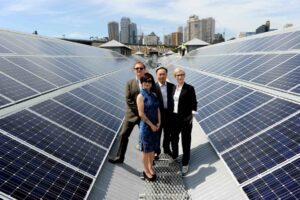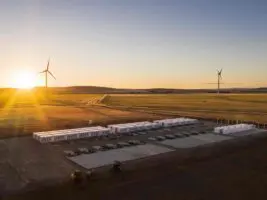On Friday, a 28-page text covering the main policy fields cursorily was published after a previous draft had been leaked. For energy policy, the changes are encouraging, but a lot of question marks remain. Craig Morris takes a look.

The two largest German parties, the Christian Union and Social Democrats are negotiating a continuation of their “grand coalition.” At the beginning of last week, the energy section of the text being negotiated was leaked. It indicated that the new German coalition would give up on the 2020 carbon target: “It appears unlikely today that the short-term target for 2020 will be reached,” the draft stated. There was less reporting about the follow-up sentence, however: “We will adopt a strategy to close the gap as much as possible and reach the goal at the beginning of the 2020s.”
Perhaps because of the public backlash, the final version of the document (PDF in German) now reads, “We are committed to the climate targets for 2020, 2030, and 2050. We aim to close the gap towards reaching the 2020 target as quickly as possible, and we aim to reach the 2030 targets on time in any case.” The public debate now focuses on the leeway that “as quickly as possible” opens up. Indeed, the document raises as many questions as it answers.
One rare specific number is a new target for renewable electricity: 65% by 2030. The old goal for that year was 50%. The new one makes sense; Germany reached its 2020 target this year and is progressing at a pace to be 100% renewable by 2030, so greater political ambition is needed to keep up with market realities. Now, an additional 4 GW of onshore wind and 4 GW of solar are to be auctioned in addition to an unspecified additional amount of offshore wind – “half of it in 2019 and half in 2020.”
This change comes out of nowhere; I haven’t found anyone yet who saw this coming. The previous coalition of the same parties started switching to auctions in 2014 specifically to slow down the pace.
It will be impossible to build more offshore wind by 2020, so it remains unclear what that passage means. Solar should be easy enough to build within that timeframe, which is more challenging for onshore wind, however. Perhaps the politicians hope that the large number of projects that lost in previous auction rounds can just reactivate their efforts so that projects can be completed on time.
For coal power, the paper is both encouraging and uncommitted. On the one hand, 1.5 billion euros is to be set aside for structural change in coal regions. But no date is given for a coal phaseout. Rather, a commission on “growth, structural change, and jobs” consisting of “politicians, business people, environmental organizations, labor unions, and affected regions” shall propose a plan to “gradually reduce and end coal power.” Whatever date the commission proposes, it will only be a recommendation, which the government can still ignore. It’s also unusual for a commission to formulate such important policy details; usually, politicians want such high-visibility items for themselves – but this potato seems too hot.
What’s missing from the list of proposed commission members is researchers and engineers. Someone needs to remind politicians that 65% renewable power – which will be 55% wind and solar in Germany – will practically mean the end of coal power by 2030 anyway. Rather than formulate a phaseout like the nuclear one, with specific deadlines for each reactor, the politicians apparently prefer to expand renewables (with priority dispatch!) so quickly that the market will become unprofitable for coal power, and companies will voluntarily shut down facilities.

Mobility – an overlooked field – is dealt with 17 pages earlier under “infrastructure,” not under climate for the Energiewende. Expect this blind spot to persist. In the building sector, the paper vaguely commits itself to increasing the share of renewables, but no target is provided.
Overall, the document encouragingly shows that German politicians take the embarrassment of missing a carbon target as an incentive to do more. As Stefan Gsänger, Secretary-General of the Bonn-based World Wind Energy Association, put it, “I don’t think this paper is as bad as the one four years ago.”
Finally, it’s important to note that climate and energy take up only one of the document’s 28 pages, and the preamble mentions neither. Some press reports on the paper (like this one in German) don’t mention those topics either. It’s important for climate hawks to remember that issues like health insurance, the job market, immigration and the state social support system are bigger concerns for most people.
New German coalition agreement allows 180,000-200,000 refugees to enter Germany each year … that’s 4 times the number Trump set for the US this year for a country with a population ¼ the size of US.
— Ivo Daalder (@IvoHDaalder) January 13, 2018
On Sunday, 235 Social Democrat party delegates will vote on the proposed coalition agreement. If it passes, a grand coalition is likely. No other German party presents coalition agreements to a delegation for approval. Some Christian Union politicians have criticized the SPD’s policy, saying that they want to speak with negotiating partners who can actually make decisions.
Source: Energy Transition. Reproduced with permission.








